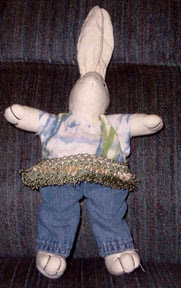Had you asked me, 5 or 6 years ago, if I was actively protecting the environment, I would have assured you that yes, indeed, I was. We gardened, we composted, we didn't litter. No fur, no ivory, no teak or mahogany. When we bought new appliances, we got energy saving ones. In the summer we mostly grilled, so as not to turn on the oven, and in the winter we kept the thermostat turned down. I mean, we were old hippies, with subscriptions to Mother Earth News! Of course we were environmental. We were part of the solution.
Then I was introduced to Colin Beavan's blog, No Impact Man, and from that I found Riot 4 Austerity. I began to realize that we were, indeed, part of the problem. Granted, these blogs represent extreme examples of environmentalism, but they gave me a lot to think about. Things that were uncomfortable. I realized that while I was environmental in theory, laziness and ignorance were keeping me from practice. Once I realized I was faking it, I was able to change things so we were making a real difference. I realigned my activism with my core values.
This morning I read a post at The Green Phone Booth that caused me to think about those core values regarding environmentalism The author, known as the Green Raven, ends her post by saying "How about you? How much has "religious" thinking—be it God-centered or non-theistic ethical thought—inspired you to feel responsible for the earth and its inhabitants? Does your spiritual practice reinforce your commitments? How much has it motivated you to act"
Raven's post reminded me of a couple of books that were fundamental in helping me crystallize a plan about how I wanted to live on this earth. Both are cookbooks, commissioned by the Mennonite Central Committee.
Years ago, probably 25 or more, I bought a cookbook from a food coop where we chopped. It was called More With Less, and focused on frugal living and whole foods. My copy is battered and worn- I have used it a lot. I bought copies to give to at least two of my sisters.

Even the rabbit enjoyed the cookbook, as evidenced by the missing corners. When we moved here to Central Pennsylvania, I was amused to find contributed recipes from women with familiar names- we live in the midst of a large Plain community and many of the recipes came from towns close by.

More With Less was a good cookbook, but not life changing. However, the sister publications Extending the Table and Simply in Season ARE life changing books. The recipes are good, but for me, the most important part are the comments from recipe contributors. Read for pleasure, these glimpses into other lives illuminate and inform.
For example, on page 166 of Simply In Season, under a recipe for Vegetable Pizza Bites, you find this:
"A crop of healthy children. For us as CSA farmers, having direct contact with our customers is incredibly meaningful and rewarding. We learn so to know many of their favorite vegetables and often have specific people in mind when we are planting or tending a crop.
"It's a pleasant surprise to find that many people, especially those with young children, will spend hours at the farm when they come to pick up their produce. They'll sit in the shade, swing on the rope swing and pick basil until their fingers are pungent.
"From year to year we get to see the children of our returning customers grow up and we have a sense of privilege in knowing that our vegetables are helping their bodies grow strong and healthy. This feeling is especially keen as we watch expectant mothers select their vegetables and know that we are contributing to the health of their growing babies."
Jon and Beth Weaver-Kreider, Goldfinch Farm CSA, York, PA

I was wary at first about Extending The Table- I don't have much use for missionaries. In my mind, missionaries are always dressed in clothing inappropriate to the climate, frowning and insisting that the poor pagans need to adopt modern Western ways. I was so humbled by the stories and descriptions included in this book- it was so respectful of the people and their lives. On page 94, I read this "Mbodangaaku, the tradition of the Wodaabe, is the way we hold hands with one another. This is the way we feel attached to each other.
"Mbodangaaku is the only wealth of the Wodaabe. It is their true wealth. When we go to the villages of the sedantary people, we are hungry and thirsty because no one gives us anything without money. But when we travel in the bush, wherever there is a Wodaabe camp, we are at home.
"When someone comes to your camp, it is because of the tradition of Mbodangaaku that you welcome him. You take a mat for him to the west of your camp. You take him water to drink. You light a fire for him even if it is not cold. You take him food.
"Even if you yourself do not like your guest, when his foot comes to your camp, you go to welcome him as if he were your God. The proverb says "Your guest is your God!" Bodaado man of the nomadic Wodaabe tribe of Niger.
As much as that subscription to Mother Earth News, these cookbooks affected the way I see and interact with the world. This time, instead of buying copies for my sisters, I bought them for my children and their families. I hope they find as much benefit as I did.










